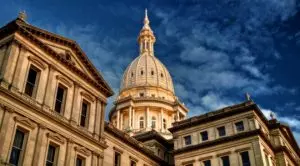 Michigan lawmakers are in the middle of discussions which aim to pass a new legislation in regard to the regulation of interactive gaming within the territory of the state. The discussions come as a result of the legislators’ attempts at giving the state’s budget a boost while at the same time quelling the protests on behalf of online gambling opponents.
Michigan lawmakers are in the middle of discussions which aim to pass a new legislation in regard to the regulation of interactive gaming within the territory of the state. The discussions come as a result of the legislators’ attempts at giving the state’s budget a boost while at the same time quelling the protests on behalf of online gambling opponents.
The plan outlined by Michigan legislators includes utilising various brick-and-mortar gambling establishments on the territory of the state as outlets where online casino gaming can be legally offered. The said gambling establishments would include the Indian casinos within Michigan as well as the three largest commercial gambling venues in the state, namely the Greektown Casino, the MGM Grand Detroit, and the Motor City Casino, which are all located in the city of Detroit.
However, there is one catch in the legislation that is currently subjected to discussions that would render online gambling regulations within Michigan unlike the legislation of any other American state. The idea of the Michigan lawmakers is to allow players from the state to legally engage in interactive casino games and online poker as long as the said players are physically located on the floors of licensed brick-and-mortar gambling properties within the Wolverine State.
Several factors might have contributed to Michigan lawmakers coming up with the peculiar legislation. One of the reasons which might have prompted the Michigan legislators’ decision is the apprehension of the Indian and commercial state casinos about potentially parting with some of their revenues if regulations on online gambling are indeed enforced.
According to statistics, the gambling operators within Detroit alone can potentially face losses between $1.5 million and $4.5 million if the new bill is approved. Proponents of the bill argue that if players remain within the boundaries of the land-based gambling establishments, they could at least generate revenue for the house from other streams, such as shopping outlets, bars, restaurants, and so on.
However, this line of reasoning evokes the question as to why would players wish to engage in interactive casino games if they are already in a land-based gambling establishment. This was precisely the question David Schwartz, Director of the Center for Gaming Research at the University of Nevada, Las Vegas, raised when asked on his opinion for the new online gambling legislation. Schwartz went as far as to liken this proposition with people driving to Home Depot just to order an item on Amazon.
Another issue that Michigan lawmakers are trying to overcome is appeasing the discontent of the constituents of the state. It all has to do with the amendments, introduced to the state’s Constitution back in 2004. A clause was added to the Michigan Constitution which stated that any gambling expansion within the state, be it live or interactive, needs to be put up for a referendum to be voted by Michigan residents.
The only way around the said amendment is if interactive gaming is offered by any of the licensed state gambling operators or from the Indian casinos in Michigan. These are the only gambling venues which do not need approval on behalf of the Michigan citizens.
The new online gambling bill was approved by the local Senate Committee at a special hearing that took place at the beginning of March 2017. Thus, the new gambling legislation was allowed to proceed to the Senate floor for further discussion but was met with strong protest on behalf of local gaming tribes that are allowed to run gambling establishments in the state. Following the recent turn things have taken, it appears that Michigan’s battle to pass interactive gaming regulations and join New Jersey, Nevada, and Delaware, still lies ahead.
- Author


